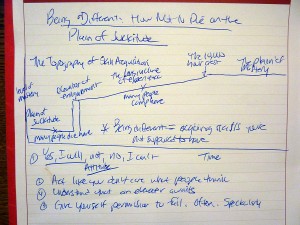 I will be participating in the ALIA Information Online conference in Brisbane, Australia this month. One of the most interesting and enjoyable activities I will be participating in is a seven minute lightning talk on a topic having to do with the conference theme of be different, do different.
I will be participating in the ALIA Information Online conference in Brisbane, Australia this month. One of the most interesting and enjoyable activities I will be participating in is a seven minute lightning talk on a topic having to do with the conference theme of be different, do different.
I like to think I know what it means to be different. I left public school in California after the 8th grade and spent the next two years in an alternative school (read “permission to smoke dope”). I helped my parents build two geodesic dome homes in Indiana before leaving home two weeks after my 18th birthday to return to California. Along the way I learned to bake, sew, embroider, and build treehouses — one of which I slept in during an Indiana winter (fully enclosed with a wood stove).
In foothills of the Sierra Nevada Mountains in California Gold Country, I achieved my GED, took classes at a community college, and eventually decided to go to library school. Along the way I became a commercial whitewater river guide, and soon led several private trips down the Colorado River through the Grand Canyon.
Given this history, I believe I have an idea about what it means to be different. In looking back at what I think makes me different, I think it boils down to acquiring skills you’re not supposed to have. I’ve spent my life doing this. I’ve never let anyone dictate what skills I should or should not have. I’ve acquired every skill I could imagine wanting, from cooking to carpentry. I couldn’t imagine doing anything else.
So in preparing for my talk, I gave a lot of thought to how we acquire skills and the barriers that stand in our way. One night, around 3am, I lay in bed wide awake while mapping the topography of skill acquisition in my mind. Lest I forget by morning, I got out of bed and sketched it (see image). The final diagram tracked it almost exactly. I will introduce the diagram and the various parts in the next post. Although you can’t all be there with me in Brisbane, you can follow along here at this blog.
Next up: The Topography of Skill Acquisition


I like the idea of this but am a little unsure of the premise being not what you’re supposed to learn. I currently work in a progressive school that tries to help the students study and learn what they want within the school.
Supposed to and should are ideas that I find difficult from any angle as they deal so much with specific expectations. Its also a way to start informally ranking things such as play, work, good, bad instead of knowledge which is the heart of education. I’ll be curious to read more as embracing differences and working with them is one of the best ways to support students.
Kate: What does it mean to “be different”? To me, it means that you are outside of what society typically expects of you. For example, most people do not expect a librarian to also be a commercial whitewater river guide. Nor do they expect a teenage boy to know how to cook, bake, sew, and embroider. My life has been one of breaking these preconceived notions, and I highly recommend it to everyone. So I really don’t think we disagree at all.
I see and I do agree in general, the phrasing is just troublesome for me. I’d rather try and frame things without the preconceived notions than working against them. Why focus on the box of societal expectations especially gender than try and create a larger world?
Since the danger of going but I’m not this or this is that the power still lies in comparing to who or what you should be.
I’d rephrase it by going. What makes you different is what’s your passion, what have you poured your energy into? That’s what you care about learning and so let’s follow after that and use it. Take away any comparison. Thank you for creating this discussion.